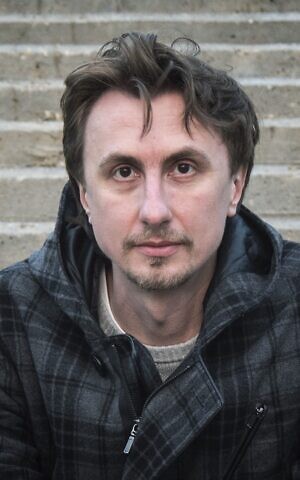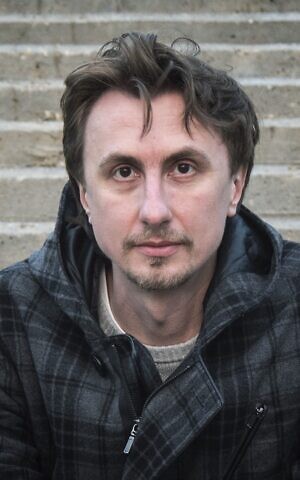
Russian filmmaker flees Moscow to Israel due to documentary critical of Putin regime
When Russia invaded Ukraine on February 24, 2022, filmmaker Dmitry Bogolyubov decided he had to flee his native country. He, his wife and young daughter packed three suitcases and booked one-way tickets on an Aeroflot flight before the airline suspended international flights on March 8.
The family’s destination was Israel, where they immigrated in 2017. Back then it was only a brief aliyah, with the Bogolyubovs returning to Moscow later that year for work and personal reasons. This time they are in Israel to stay, said Bogolyubov.
“It was obvious we could no longer associate ourselves with Russia. Living in Russia under Putin is like living next door to a maniac,” Bogolyubov said.
With almost all their like-minded liberal friends and colleagues having left Russia in the years since Russia’s 2014 invasion of Crimea, Bogolyubov and his wife — both of whom have made films critical of the Putin regime — knew it was time to go.
Bogolyubov, 42, spoke to The Times of Israel from his new home in the central Israeli city of Rehovot as he geared up for screenings of his 2019 documentary, “Town of Glory,” at the Tel Aviv Cinematheque on April 10, and the Jerusalem Cinematheque on April 14. The film is also available for online viewing on the DW Documentary YouTube channel.
“Town of Glory” explains why a disturbingly high proportion of the Russian population supports Putin and the current war in Ukraine.
“We are showing the roots of what is happening now,” Bogolyubov said about his film.
The film is a snapshot of Yelnya, a rundown and impoverished town in western Russia, 370 kilometers (230 miles) from Moscow. The town was the site of a Russian military buildup already last year in preparation for a potential invasion of Ukraine.
Bogolyubov had originally thought to make a film about Yelnya from a nostalgic or romantic angle, showing a town frozen in the Soviet past — which it clearly is. He was able to gain access to local residents thanks to his having summered as a teenager with his family in a nearby dacha (cottage).
“But then when I started filming, I realized that there was a militaristic hysteria grabbing the people’s minds,” he said.
According to Bogolyubov, Yelnya is representative of countless towns and villages throughout the Russian Federation. However, Yelnya has a distinct identity and history in that it is the site of the first Soviet victory against the invading Germany army in World War II. It’s a heritage that the locals are extremely proud of, despite the fact that the victory cost 32,000 Red Army casualties, and was reversed within a number of weeks.
Just about everything in Yelnya revolves around commemorating the Soviet victory over the fascists in WWII. Not only do the townspeople mark Victory Day and Defender of the Fatherland Day, but they also have their own special Town of Military Glory Day. “Town or City of Military Glory” is a designation given to only 45 localities where soldiers displayed outstanding courage in WWII.
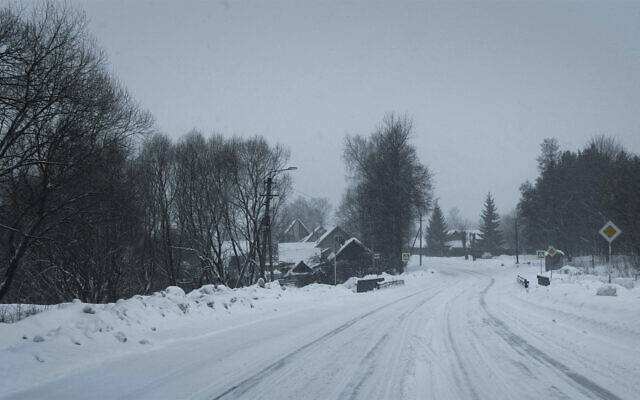
Scene from Yelnya, Russia in Dmitry Bogolyubov’s documentary film, ‘Town of Glory.’ (Courtesy of First Hand Films)
But it’s not just about the past. “Town of Glory” shows how this obsession with historic military feats is a tool of manipulation used by the authoritarian Russian regime to keep today’s citizens paranoid about the perceived enemy: NATO and the West. At public events, official speakers from Putin’s United Russia party constantly proclaim against Russia’s “malign and evil” enemies, warning against “terrorists,” “fascists” and “Nazis” who must be struck down. They use doublespeak, talking of peace when they mean war.
The people of Yelnya appear to swallow all this hook, line and sinker — from the many drunks sitting around, to an old woman who likes Putin because she sees him take communion on (government controlled) TV, to a middle-aged military veteran named Svetlana who longs for the reemergence of the USSR and defines patriotism as love for Putin.
“People really love Putin. Some of my associates observed the voting in the 2018 election because they believed there had to be voter fraud. But it turned out there was none. People really voted for Putin,” Bogolyubov said.
[embedded content]
Svetlana’s 16-year-old daughter Masha is the most prominent character in “Town of Glory.” A tragic figure, she immerses herself in everything related to World War II and military glory to the exclusion of everything else. Stage managed by her domineering mother, Masha performs old-fashioned military songs in uniform (including at a talent show with scouts from Moscow, where the other girls sing popular songs while wearing contemporary teen fashions), and writes poems and children’s books on military themes.
In reality, the awkward teen has no family connection to WWII and no true understanding of the horrors of war.
When asked by a TV crew about this at a military fair introducing weapons and hand-to-hand combat to youth, Masha simply states, “Patriotism is my thing.”
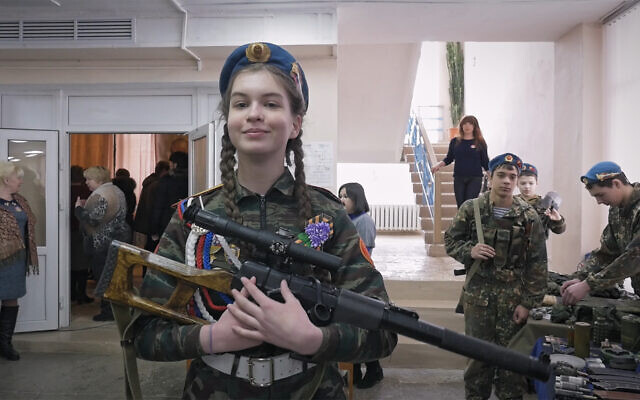
Teenage Masha in her Youth Army uniform. She is obsessed with WWII Russian history and patriotism in Dmitry Bogolyubov’s documentary film, ‘Town of Glory.’ (Courtesy of First Hand Films)
Masha is a member of Russia’s Youth Army, a national program providing weapons and other military training to children and teens. Its aim is to encourage youth to choose the military, and if not, then at least to ensure that they do not avoid conscription, which is mandatory for all males for one year between the ages of 18 and 27.
“It is mandatory for the children of army officers to be in the Youth Army, and all other kids are highly encouraged to join. It is good in that it provides structure and unity to youth who otherwise would have nothing to do and just be getting into trouble. But underneath it is military propaganda,” Bogolyubov said.
The film shockingly shows even elementary school children pledging to the Youth Army, and kindergarten students marching as they sing military songs around a classroom adorned with images of tanks and rocket launchers.
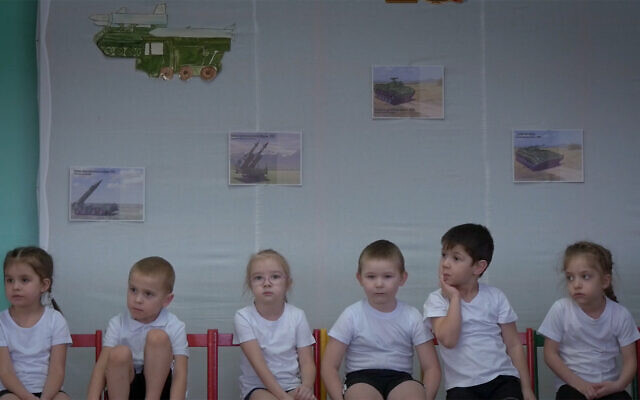
Kindergarten students sing military Russian songs in a classroom decorated with pictures of weapons in Yelnya, Russia, in Dmitry Bogolyubov’s documentary film, ‘Town of Glory.’ (Courtesy of First Hand Films)
Some of the young children pledge to the Youth Army on the same day of a burial ceremony for the remains of dozens of Word War II Soviet soldiers that were recently discovered.
Another main character in the film is Sergey, a middle aged man who lives with his wife in a rickety old house without indoor plumbing. He digs up the soldiers’ remains for a living. It’s evident that Sergey, unlike the young Masha, can see how in Russia, even giving honor to the fallen is done cynically.
“Digging up skeletons shows what war really is. Sergey literally reveals the face of this when he finds a skeleton with intact teeth, showing that it was a young man. But the regime is doing this in manipulative way. They speak of the fascists back then and tell the people that the West are fascists who want to kill them now,” Bogolyubov explained.
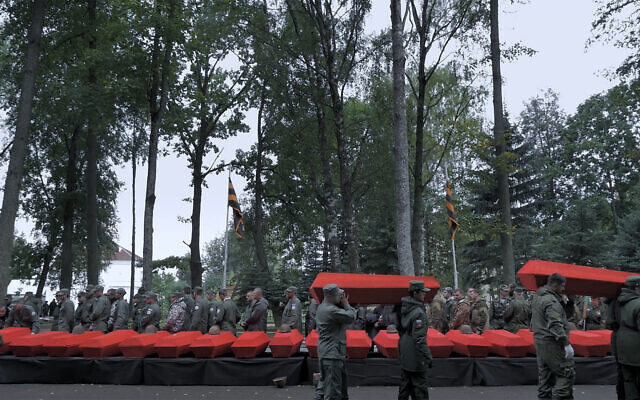
Burial ceremony for recovered remains of WWII Russian soldiers in Yelnya, Russia, as seen in Dmitry Bogolyubov’s documentary film, ‘Town of Glory.’ (Courtesy of First Hand Films)
The filmmaker said he sees no way back to Russia for him and his wife as artistic professionals.
“As hard as it will be to start over in Israel, our future in Russia would have been even more blurry. I would not take funding from the Russian authorities for my work for ethical reasons, and in Russia you can’t get any money from abroad anymore,” Bogolyubov said.
Staying in Russia would also have meant facing censorship from the Russian ministry of culture, and the possibility of being prosecuted and jailed.
“The media and human rights NGOs have been marked as foreign agents. We could have been next,” he said.
Although Bogolyubov is proud of “Town of Glory,” he is frustrated that it is not being seen by the audiences he created it for. He feels like he is preaching to the choir as the Czech-German coproduction is screened outside Russia.
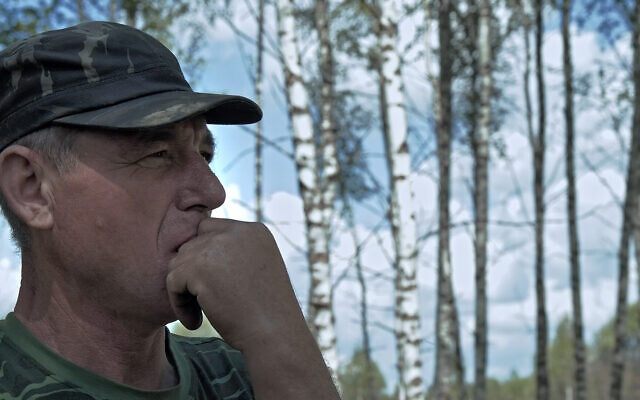
Sergey reflects as he goes out to dig up remains of Russian WWII soldiers in woods surrounding Yelnya, Russia, as seen in Dmitry Bogolyubov’s documentary film, ‘Town of Glory.’ (Courtesy of First Hand Films)
The filmmaker said that overall he is pessimistic about his homeland’s future. He had hoped that the oligarchs and generals would have overthrown Putin before he invaded Ukraine, but that didn’t happen.
“Now there is only the people, and history tells us that in Russia there are no revolutions from the bottom. Russians are used to surviving in awful conditions. They don’t care about human rights and freedom. They only care about surviving, and that is a dangerous thing,” Bogolyubov said.
In the film, a drunk Sergey, who knows well the devastation of war, makes clear that he knows this too, but also that he is in no position to do anything about it.
“What is happening to us, to millions of people?…We are not living. Just surviving,” he cries. “We are good, hardworking people. What is being done to us by life? By fucking Putin?”

